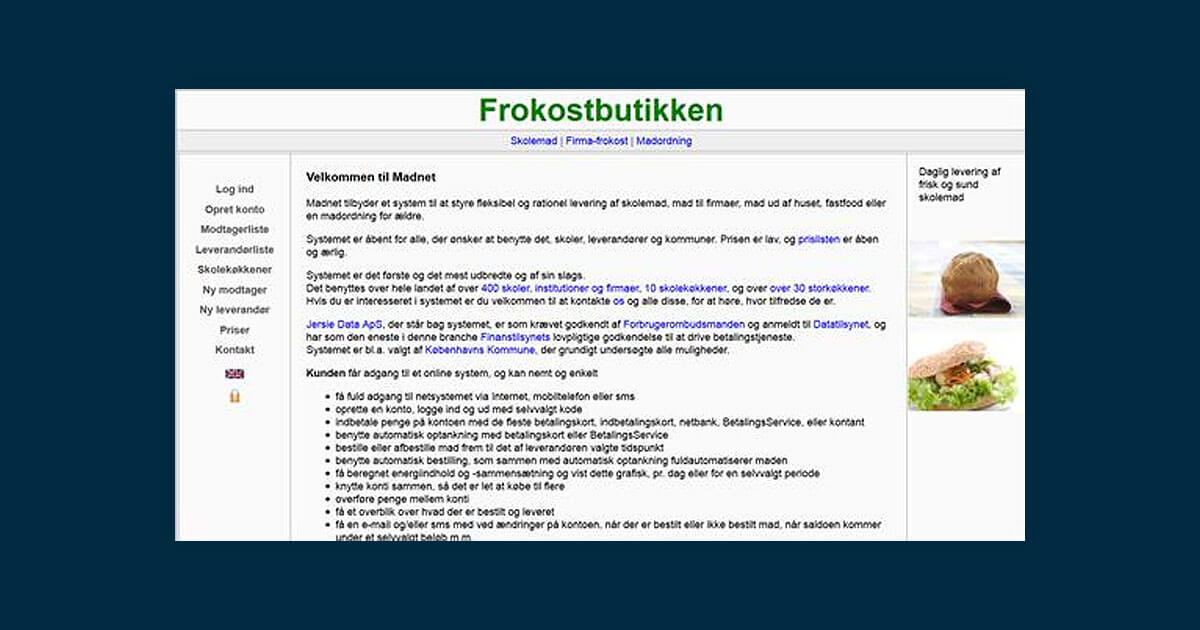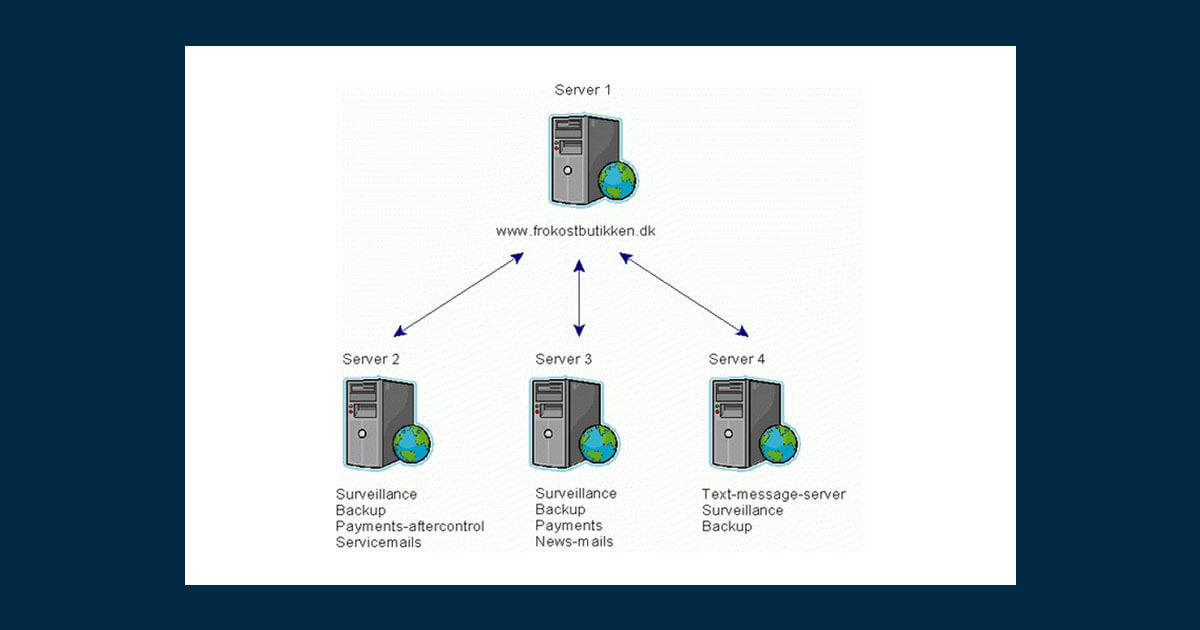Revolutionising Lunch Delivery with Dyalog
From pupils to pensioners, through company lunches to birthday parties at the swimming pool – they all get their lunch on time. Using Dyalog, Jersie Data ApS in Denmark has developed a comprehensive online lunch shop called www.Frokostbutikken.dk. A country-wide network of suppliers ensure that more than 25,000 users can choose their lunch items online and get them delivered to the right place, at the right time – every day.
From Paperwork to Digital Efficiency
“In 2005 one of our clients began to deliver school lunches from Café Regnbuen in Glostrup – a suburb to Copenhagen. They were literally drowning in paperwork when processing the daily orders – and even more so, when handling the payments. They asked if we could develop a software program which would enable them to take the orders and the payments into an Excel spreadsheet as this would make the administrative process much simpler and faster. Oh, and by the way, could we aim to solve the task more or less free of charge, as they were strapped for cash. However, in this day and age using an Excel spreadsheet is not the right the way to solve this kind of problem. Instead, we proposed to develop an Internet-based application using Dyalog – a software development environment we have been using through many years for the development of complex financial applications, that is, TDC’s contract management system,” Tommy Johannessen, Managing Director of Jersie Data ApS explains.
“Unfortunately it is not free of charge to develop software, so we agreed that they would pay a commission of DKK 0.25 (2.5 pence) per sandwich, mostly because I had the expectation that each lunch order would consist of 4 small sandwiches as was the case when I went to school. But the change in food habits has long since overtaken my schooldays and today the children want sandwich rolls, fruit and lots of other different foods, so it became rather complex suddenly. The solution to the conundrum was an agreed commission of 5% of the revenue. We got more clients fairly quickly and within the first couple of months we had signed up Diakonissestiftelsens Køkken in Copenhagen and Go’ Appetit in Naestved as customers. Both of these suppliers had a large customer base, and when Diakonissestiftelsens Køkken announced that they expected revenues of DKK 200,000 per month we decided that a differentiated pricing structure would be fair for small as well as for large suppliers. This model has been so attractive for the suppliers that I now consider Frokostbutikken as my pension,” Tommy says with a smile.
The price structure for the suppliers is completely transparent which is quickly proved if you visit www.Frokostbutikken.dk. The supplier simply keys in the expected revenue and the system then calculates the commission for the month on the spot. It’s also very easy for the users – they just have to set up an account, transfer appropriate funds and start ordering.

The figures bear testament to the success. Today, Frokostbutikken has more than 25 suppliers located all over Denmark and, since the solution is completely scalable, there is room for more. All suppliers have their own website built into the system, and Jersie Data has developed a series of templates with fixed tags which makes it incredibly easy for the suppliers to upload new menus, new pages, news and pictures. If a supplier has difficulties managing their website, Jersie Data will assist them with the uploading – as a service. Most of the suppliers have been recruited through internet marketing and Google AdWords, but the Frokostbutikken homepage is actually the strongest possible marketing tool one could ask for. Lovely pictures of mouthwatering food makes it easy for the users to choose.
“It is my impression, that there are more schools who would like to get food delivered than there are suppliers for at the moment. Transport is a big issue as it adds significantly to the cost of the food order. It is not uncommon that transport for each delivery is upwards of DKK 150 (£15). This obviously sets a limitation with regards to how few pupils can order food on a daily basis. Generally we see larger schools, where parents are willing to foot the bill, signing up. On top of that, one needs to bear in mind that the authorities have strict regulation compliance requirements for kitchens who want to deliver school lunches. Each kitchen usually supplies a given geographical area. It is up the individual supplier to maintain contracts with their customers, but demand depends somewhat on the demographics in each geographical area. We have noted that buying patterns vary from area to area,” Tommy Johannessen says.
Delivery on Time – Every Day – Makes All the Difference
One is tempted to ask what makes Frokostbutikken unique in comparison to any other online shop?
Tommy Johannessen explains “There are several aspects which set Frokostbutikken apart from other internet shops. First of all, we have more than 300 different delivery places located all over the country. Secondly, the system can handle daily, weekly and monthly orders. Which order routine any given supplier chooses to work with mostly depends on what they find most feasible from a purchasing point of view. Dyalog makes it very easy to operate with rolling weekly and monthly menus. We teach each supplier a minimum of mathematics in order to enable them to log on and change their menus. Menus can have different payment terms and many suppliers operate a larger menu which require ordering in advance and a smaller more restricted menu in terms of menu items which can be ordered on short notice. Remember, all orders have to be delivered on time, to the right place, every day”.
Frokostbutikken has enjoyed a remarkable development over the past three years. Today, many suppliers also offer ready meals for pensioners and company lunches. There are even some who combine offers of birthday party food at the swimming pool with tickets for various events. You book the tickets on Frokostbutikken and receive them via the post. Even “Take-Away” is offered by certain suppliers. When you place the order, you just have to specify what time you intend to pick up the food.
For companies, the advantage is that the order is booked online, quickly, easily and cheaply. Mostly the companies in question have 5-20 employees. They’re too small to offer on-site canteens but are still of a size that makes them interesting for the suppliers. Typically company lunch offerings carry a more sophisticated menu, catering to adult taste buds.
“Det Gamle Køkken is a good example of a supplier who is also delivering ready meals for pensioners. Many pensioners are fully capable of ordering their food online, and for those who may have difficulties, the local pensioners’ centre or friends and family are often ready to assist.
“We also have suppliers who offer online grocery shopping. This – as well as Take-Away – requires that a small add-on program, which we have made available, is activated. When the supplier’s PC is online with the ordering system activated, the shop is open. Incoming orders are read in the loud speaker system in the kitchen via synthetic voice, in addition to being printed,” Tommy Johannessen explains.
By using component files we can store all the transactions on any given day in one and the same file. It also makes it incredibly easy to do a back-up, as all we capture are the appended orders since the last back-up. A back-up is taken every 10 minutes from three different servers so it is an incredibly safe system,
The Technology
During the summer of 2008 the system was enhanced with text message ordering from mobile phones. In principle therefore, a user doesn’t have to be connected to the internet to place an order. It is also possible to choose a version with smaller screen images to allow users with PDAs or mobile phones with internet access to use the system.
Jersie Data has previously developed large software solutions based on Dyalog and the company has extensive experience using component files.
“By using component files we can store all the transactions on any given day in one and the same file. It also makes it incredibly easy to do a back-up, as all we capture are the appended orders since the last back-up. A back-up is taken every 10 minutes from three different servers so it is an incredibly safe system,” Tommy Johannessen says. “All three machines are online 24/7. Two of them are placed in two different datacentres and one is located in the company. Geographically we have taken everything into account and, should one server break down, the other two have been updated within the past 10 minutes. If something should happen to the primary server we can physically change the DNS and let one of the other servers take over as main server. But to date, this has never happened.”
“The solution is completely scalable. In principle there is obviously a limitation with regards to how many simultaneous users the server can handle. We upgraded the system to larger servers with more processor power last year. Frokostbutikken now operates with 2 Xeon 4 core processors and they have never met the limit.”

Efficient User Engagement and Continuous Innovation
“Currently we have around 44,000 accounts open in the system – of which 25,000 are active users. The rest only order occasionally or they may have forgotten they have an account. The users are generally logged on for a very short time. It should not take more than max. 2 minutes to complete an order, and the user files continuously keep an eye on how many users are logged on. As an example, today we had more than 500 users measured over a period of 30 minutes.”
“We continue to focus on upgrading the solution with new functionality. We keep a running and open dialogue with suppliers and users in order to decide the next moves. We are also in talks with others who have ideas for online businesses. The solution is perfectly suited for trade that requires repeated deliveries on given days at given times. This is simply what makes this application unique in comparison to any other online shop.
“We were amongst the first to use Dyalog for such a large comprehensive internet application. We received very good support from Dyalog Ltd, the company behind the Dyalog software. This we value highly as, especially initially, it allowed us to solve any problems we faced, quickly. Now the operation of the application is completely smooth, and I expect to take a nice long Christmas holiday this year,” Tommy Johannessen concludes.
Examples of real-world applications of Dyalog in different sectors such as automotive, education, healthcare, finance.
